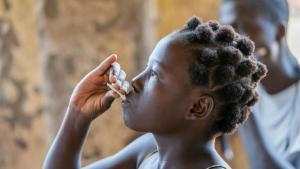Vaccines help battle cholera outbreak in Malawi
Lilongwe, Malawi – In late 2022 staff at Tukombo health centre, a stone’s throw away from the shores of Lake Malawi, were stretched to the limit. The small facility in northern Malawi had been repurposed to serve as a cholera treatment centre to care for hundreds of patients as cases surged amid the country’s worst outbreak.
At the peak of the infection wave, Tukombo area (in Nkhata Bay District) accounted for 60% of the 1500 cases recorded then in the whole of Malawi’s Northern Region. “We had to work double shifts. It was a stressful situation,” recalls Dyson Tchuwa, a health surveillance assistant at the health centre.
Now operations at Tukombo have almost returned to normal after several hectic weeks, thanks in part to a vaccination campaign in November 2022 that helped stem the tide of infections.
Since the onset of the cholera outbreak in Malawi in March 2022, World Health Organization has supported the country to access 4.9 million doses of oral cholera vaccines from the International Coordinating Group—the body that manages emergency supplies of vaccines— with funding from Gavi, the Vaccine Alliance. To date, vaccines have been deployed in 21 out of Malawi’s 29 districts. In May and June 2022, 1.95 million doses were administered during a campaign in nine of the most affected districts, in the country’s Southern region. A second batch of 2.9 million doses arrived in October and WHO together with UNICEF supported a vaccination campaign in 14 more districts. In Nkhata Bay District, the number of news cases decreased from 381 in October 2022 to only 43 in December 2022.
For both campaigns, only one dose was administered instead of two, due to the global shortage in oral cholera vaccines.
“I know the dark side of cholera”
“I almost lost my life,” says Jones Chinula, a fisherman in Tukombo, as he shows his vaccination certificate. “I spent five days in hospital fighting for my life. I know the dark side of cholera, and this is why I am happy that the vaccine has been made available in my area.”
Since March 2022, Malawi has reported over 44 500 cases and nearly 1440 deaths. The first cholera cases were reported in the country’s south following floods. A total of 10 districts were affected as of July 2022. The disease then quickly spread to the north of the country and by the end of October 2022 all 29 districts were affected. The government declared the outbreak as a national public health emergency on 5 December 2022.
Cholera is an acute intestinal infection caused when someone consumes food or water contaminated with the bacterium Vibrio cholerae. Untreated, cholera can kill within hours. People living in places with poor sanitation and unsafe drinking water are most at risk.
“The trend of cholera changed significantly in the Southern region after the oral cholera vaccination campaign, and this helped the government to focus on other aspects of rebuilding the health system post-floods,” says Dr Charles Mwansambo, Secretary for Health in the Ministry of Health. In Nsanje, one of the most affected districts in the Southern region, cholera cases dropped from an average of 10 cases a day to less than three cases a day between May and December 2022. Despite the rainy season, which saw an upsurge of cases in a number of districts, Nsanje is still reporting low case numbers.
Cholera vaccination is crucial in outbreak control but should be complemented by measures to address the triggers of the disease. In Malawi, cases continue to increase in many districts, including some where cholera cases are usually not reported as the rainy season continues.
Multi-sectoral interventions
“Oral cholera vaccination should be used in conjunction with improvements in water and sanitation to control cholera outbreaks and for prevention in targeted areas known to be at high risk for cholera,” says Dr Neema Kimambo, WHO Representative in Malawi. “We will continue to engage with partners and donors to ensure that if a need for additional oral cholera doses arise, we are well prepared and support the Ministry of Health accordingly.”
A surge in cholera outbreaks globally has strained the supply of cholera vaccines, prompting the International Coordinating Group to temporarily suspend the standard two-dose vaccination regimen in cholera outbreak response campaigns, using instead a single-dose approach.
“Vaccine is an additional tool for the response, and in the absence of it, we are working with the Ministry of Health and partners to employ multi-sectoral interventions to effectively control cholera,” says Dr Kimambo.
In Tukombo, where health surveillance assistant Tchuwa and his colleagues expended huge efforts to vaccinate the population, the fight is not over. “Apart from the vaccination, we have intensified chlorine distribution in households for water purification and we are engaging fishing villages on water, hygiene and sanitation to ensure that we contain the cholera outbreak,” he says.
Communications Officer
WHO Malawi
email: mukhunav [at] who.int (mukhunav[at]who[dot]int)
Tel: +265 999 375 094
Media Relations Officer
WHO Regional Office for Africa
Email: dalalm [at] who.int (dalalm[at]who[dot]int)
Tel: +254 703 245 761 (WhatsApp)
